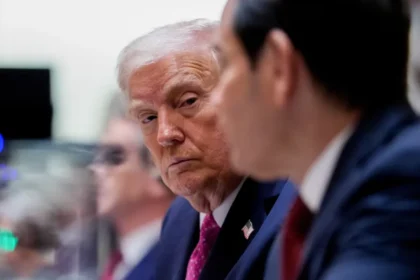A Major Reversal from President Donald Trump
President Donald Trump on Sunday urged House Republicans to vote in favour of releasing the Department of Justice documents tied to the Jeffrey Epstein investigation. The announcement marks a sharp reversal from his earlier stance, when he had discouraged Republican lawmakers from supporting efforts to force the files’ release.
In a statement posted on his social-media platform, President Trump declared that the party should “vote to release the Epstein files” and insisted that “we have nothing to hide.” His abrupt shift comes at a moment when momentum in the House has grown, with both Republicans and Democrats signalling support for greater transparency.
Growing Republican Pressure Forces a Shift
For months, President Donald Trump resisted calls to release the Epstein-related documents, frequently characterizing the issue as a partisan attempt to damage him politically. He had urged lawmakers not to sign any procedural motion that would compel a vote. But as more Republicans began breaking with leadership, the political cost of resistance increased.
A wave of GOP lawmakers publicly backed the push to release the files, arguing that the public deserves access to the records. Some Republicans even suggested that refusing to release the documents risked implying the party had something to protect. In the face of that pressure, President Trump pivoted, now presenting the release as an act of confidence and openness.
Why the Change Now?
Several dynamics converged to force the president’s hand:
-
Internal Party Momentum: A growing coalition of Republican lawmakers signaled they would support a vote, even if it meant defying leadership.
-
Procedural Realities: House members backing the effort are close to forcing a floor vote regardless of party leadership’s position.
-
Political Optics: Continued opposition could have provided Democrats with an easy narrative that the GOP was obstructing transparency.
-
Public Interest and Activism: Survivor advocacy groups and civil-liberties organizations have increased pressure on Congress to release the files, intensifying scrutiny of any lawmakers resisting disclosure.
For President Trump, supporting transparency now gives him more control over the message rather than appearing to concede under pressure.
What the Epstein Files Could Reveal
The documents in question include investigative materials, communications, and case summaries related to Jeffrey Epstein, his network, and individuals who were part of his social and business circles. While personal information for victims would remain redacted, the release could still contain sensitive or politically explosive details.
For President Donald Trump, the stakes are significant. Though he has denied any wrongdoing and minimized his past connections to Epstein, the release of additional documents could revive longstanding questions, depending on what the files contain. His supporters argue that transparency will clear the air; critics believe the release could reopen political vulnerabilities.
Reactions Across Washington
The shift triggered immediate ripples in Congress:
-
Republican Leadership: Some senior Republicans attempted to frame the release as unnecessary political theatre, but acknowledged privately that the vote is likely to proceed.
-
Democratic Lawmakers: Democrats welcomed the reversal, arguing that transparency should never have been a partisan question.
-
Advocacy Groups: Victim-advocacy organizations praised President Trump’s shift but urged lawmakers to ensure the release is comprehensive and timely.
The Justice Department, meanwhile, has emphasized the need to protect sensitive information, particularly identities of victims and ongoing investigative details.
What Happens Next?
A House vote is expected soon. If the measure passes, it will move to the Senate, where the outcome is less predictable. Even after congressional approval, significant questions remain:
-
How much of the material will be released without redaction?
-
Will the Justice Department comply quickly, or will disputes arise over privacy and national-security concerns?
-
How will the release affect President Donald Trump’s political standing heading into the next phase of his administration?
Regardless of the final vote, the issue has transformed from a marginal political dispute into a major test of transparency, accountability, and public trust.











